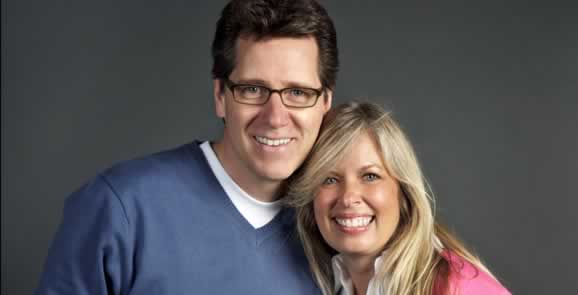Les and Leslie, where did you get the idea for Your Time Starved Marriage?
Leslie: The thing is, we had trouble finding something that would equip us as a couple. You might find books on personal time management, but nothing that would help us on the relational side of trying to capture more time together in a realistic way. We knew life wasn’t going to dramatically change, so we had to find ways to connect in the midst of that.
Les: We weren’t looking for a book that would take a radical position of cutting back things in our lives; we knew that wasn’t going to happen. The interesting thing is, we searched high and low — there are books on money management, in-laws, conflict, and communication — all these issues in marriage, but not a single resource on time as a couple. So we felt compelled to put this book together. We’ve done lots of research, finally it’s out, and already we’re hearing wonderful things from couples.
Leslie: We understood it’s a big thing for us, but we got so many comments from couples that said, we just can’t work on our marriage; we don’t have time. So we knew, we’re not alone in this.
Les: It’s the Number Two complaint couples have in their marriage — they just don’t have time together. The Number One complaint is we don’t communicate.
Would you make a distinction between good busy and bad busy? Seems to me many of us are overcommitted to good, worthwhile activities. For example, ministry, church activity, hobbies, sports activity…
Les: This is a book about how can you salvage time you’re leaving on the table.
Leslie: How to savor the moments you could be connecting.
Les. Right. We’re all busy. To say there’s good busy and bad busy, I guess the good busy happens when you feel fulfilled; the bad busy is the result of feeling frazzled. So, wherever you are on the continuum, I don’t think you can put busy into one category or another, it all melds together.
Leslie: One of the joys of this project is listening to couples and hearing how they get through their struggles. Like our friend who says when he gets over booked, he just wanders into Barnes and Nobel and buys a new DayTimer — and thinks, okay now I’ve changed my life. (laughs) We’ve all felt that.
Les: One of the things we did was include two — a men’s and women’s — workbooks. We want to pull you into an exercise and help you put it into practice.
Leslie: For us, one of the key insights is that we approach time in our own unique ways as individuals. Les doesn’t experience time like I do. So, when we even have time, we often have different goals and we feel different about time.
So what’s the downside of being too busy? How does that affect a marriage?
Les: It’s like a corrosive agent. It takes away the things we really want in the relationship and zaps our energy. For example, I know that when we’re too busy, one of the primary indicators that we’ve crossed the line is we’ve lost our sense of humor. We get short with each other. It takes the fun out of marriage.
Leslie: We get very task oriented and abrupt. We lose that affection and the stuff that makes it fun to be married.
What is a Time Bandit?
Les: Time Bandits are these little things that sneak up on us without us knowing it. These little sneaks attacks…
Leslie: My pet peeve Time Bandit is technology.
Les: Yea, technology is a big one because it’s designed to save us time. But that little cell phone or Blackberry…
Leslie: And you can’t resist it. You think, why shouldn’t I answer my phone now, if I don’t pick it up it’s creating a task for me later. We might be on a date night and I can’t imagine you’d answer your cell phone (laughs)…
Les: I know. I am thinking it’s saving me time. I was at a lunch meeting and he was doing this thing with his cell phone every few minutes, and I realized, Oh this is what Leslie feels like and this is not fun at all (laughs). Technology is just one example of a Time Bandit; there are plenty of others.
Copyright © 2007 Growthtrac Ministries.




 Jim is the founder, with wife,
Jim is the founder, with wife, 







